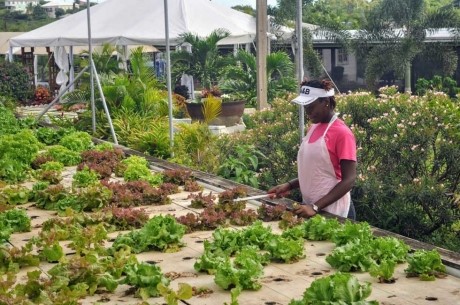January 12, 2022 – Bridgetown, Barbados – The quiet residential area of Upper Renfrew in St. John’s, Antigua and Barbuda, is home to Indies Greens, the island’s only aquaponics farm and training centre, which combines aquaculture and hydroponics to produce fish and vegetables at the same time.
This unique farm and training facility was established in 2016, to tackle the growing demand for fish products, healthier diets and lifestyles in the twin islands. The Food and Agriculture Organization of the United Nations (FAO) supported the development of training facilities on the Indies Greens Farm and funded the building of a training facility.
The particularities of this aquaponics farm do not end with the fact that it can produce vegetables such as lettuce and spinach, and herbs such as chives and mint, as well as tilapia fish for sale; it also serves as a facility for long-term training opportunities, and not just for Antigua and Barbuda, but for the entire Caribbean region.
Aquaponics is becoming increasingly popular, because it can be set up in a wide range of sizes, from large-scale production that requires public and private investments to be effectively developed to much smaller-sized ventures, making it an attractive opportunity for young farmers in Antigua and Barbuda, who may have limited financial resources.
Recognizing the need for public-private collaborative efforts, the Government of Antigua and Barbuda made the development of the aquaponics sector a priority, and sought technical assistance to grow and advance the sector from FAO.
FAO responded through the Blue Revolution Project, which supports the sustainable development and management of aquaculture, enabling Antigua and Barbuda to further develop the Indies Greens aquaponics farm (a private sector entity), while also producing training materials for future training efforts, both local and regional.
Since the establishment of the training facilities at Indies Greens, FAO and the Blue Revolution Project have formed a partnership with the farm to use it as a training facility for people from the Bahamas, Barbados and Saint Kitts and Nevis, while the Climate Change Adaptation in the Eastern Caribbean Fisheries Sector (CC4FISH) project trained participants from Grenada and Saint Lucia which brings some extra benefits to people in the region.The investment in Indies Greens is reaping benefits as the aquaponics farm is producing approximately 24 000lbs of tilapia annually and an estimated 3 500 heads of lettuce per month.
The enviable title of “master trainer” was earned by those farmers who completed the training and who can now train other farmers themselves, both in Antigua and Barbuda and across the Caribbean; some of these master trainers have also been able to design and build their own aquaponics systems, through public-private partnerships, which could generate over USD 1 000 per month, when in full swing.
With the help of FAO, international cooperation from the Global Environment Facility (GEF) and successful public-private partnerships, Antigua and Barbuda has not only increased its production of healthy food, it has also strengthened the livelihood of farmers through innovation, knowledge and technology transfer.









